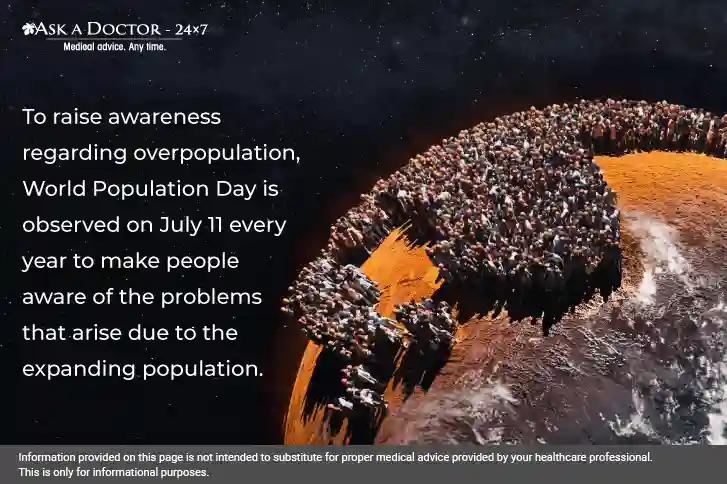Effects Of Overpopulation On Our Health
The global population is growing exponentially at an alarming rate. A nation's overpopulation can have several repercussions. There is a visible strain on resources such as energy, food, and water supply there are additional burdens like the rise of pollution, environmental damage, strain on public services and infrastructure, rising unemployment rates, and declining living standards due to overpopulation. Furthermore, the staggering rate of population growth is putting a strain on countries’ health systems and leading to disastrous consequences.
Without adequate health care, our children will not grow to their full potential. And without a healthy, productive population, our societies will not be able to realize their aspirations.
Here in this blog, we will help you understand how the population burden is connected to the lack of adequate healthcare and the rise in health issues. Read on...
How Overpopulation Rises Healthcare Deterioration?

The effects of overpopulation give rise to malnutrition, pollution, congested living conditions, and a lack of healthcare facilities - cumulatively leading to an increase in a community's risk of infectious diseases.
Further to this, the World Bank and the World Health Organization (WHO) estimate that about half of the world's population does not have access to basic medical care. The current healthcare system is overworked and unable to handle the growing number of individuals in need of treatment. Thus resulting in a lack of access to necessary medical care providers.
Common Health Challenges That Are Linked to Overpopulation
Let’s discuss how overpopulation affects human health in detail:
1. Easily spreads infection
Overpopulation and infections are closely associated. Population density raises the risk to human health because airborne illnesses can spread more quickly. Concerns like urban overpopulation and environmental changes brought on by population increase have given rise to several infectious diseases. It turns out that increased antibiotic resistance is an unforeseen problem for illnesses such as malaria, tuberculosis, cholera, dengue, etc.
2. Increases in water-borne diseases
Overpopulation is the cause of contaminated water supplies. Each year, diseases brought on by tainted water claim lives. The viruses spread more quickly in crowded environments, which makes it possible for harmful mutations to flourish and contaminate the water supply.
3. Elevates the cases of skin cancer
Another factor contributing to the ozone layer's weakening is population expansion. Increased exposure to the sun's harmful ultraviolet (UV) rays can cause early aging of the skin and skin disorders like skin cancer. UV exposure can cause cataracts and blindness, among other things. Most importantly, it damages the human immune system.
4. Increases respiratory diseases due to high air pollution
Overpopulation causes excessive air pollution, which again, is a risk factor for several respiratory diseases, like:
- Chronic bronchitis
- Chronic Obstructive Pulmonary Disease
- Cystic fibrosis
- Asthma
- Emphysema
- Pneumonia
- Lung cancer
More individuals are using road transportation, causing heavy traffic on the roads that are emitting toxic air content. Children and the elderly are most susceptible to bear the brunt of the low air quality.
Measures To Prevent Effects of Overpopulation on Human Health

Overpopulation must be addressed with a comprehensive and multidimensional strategy that respects each person's rights and choices while also taking into consideration social, economic, and environmental considerations. These measures include:
1. Family planning and reproductive health services:
Encouraging people and families to have access to contraception and reproductive health services that can assist them in making well-informed decisions about the size of their family.
2. Education and empowerment:
Putting money into education can improve health outcomes, increase economic opportunities, and reduce the number of births, particularly for women and girls.
Various health organizations and non-governmental organizations (NGOs) should endeavor to increase public awareness about the issues associated with overpopulation, as well as the significance of family planning and birth control methods, through various campaigns. The World Population Day, which is observed annually on July 11, attempts to achieve these goals.
3. Economic incentives:
To promote lower, planned family sizes, governments can institute tax cuts, subsidies, or awards for smaller families.
4. Urban development and planning:
By providing affordable housing, infrastructure, and sustainable resource usage, effective urban planning may assist support the expanding population.
5. Migration and regional development:
Promoting regional development can help disperse the population more fairly throughout a nation and lessen the concentration of people in large cities.
6. Sustainable resource management:
By creating sustainable methods for managing resources like water, electricity, and agriculture; we can lessen the burden on our finite resources.
Conclusion
Thus, we have learned so far that the growing population is a major global concern and the cause of many health problems. Recognizing the issue and taking the required action to solve it are essential. The best way to address the issue of overpopulation is to implement birth control laws and policies by governments, make birth control devices widely accessible, and raise public awareness of family planning and the hazards of overpopulation. This may help interrupt the vicious cycle of rising health problems and population growth. Consult your healthcare provider regarding knowledge of communicable and infectious diseases spreading in your geographic area.
You can consult our medical experts from 18000+ specialists at Ask a Doctor - 24x7, and discuss issues related to the community spread of infectious disease and its effect on your family.
Recently Answered Questions Related to Population and HealthCare
- What Are The Health-related Benefits Of Green Tea In An Elderly Population?
- Is Mixed Population Of Lymphoid Cells An Indicator Of Possible Lymphoma?
- What Does A Reddish Blotchy Patch On The Nose Indicate?
- What Causes Skin Rashes After Unprotected Sex?
- My Child Has Throat Infection, Fever, Urine Infection. Prescribed Monocef. Reason For Infection?
- Are Pseudomonas And Serratia Infections Contagious?
- Suggest Treatment For Allergic Bronchitis
- Suggest Treatment For COPD Tumor From Scar Tissue, Bronchitis And Breathing Difficulty
Disclaimer: Information provided on this page is not intended to substitute for proper medical advice provided by your healthcare professional. This is only for informational purposes.
Ask a Specialist
Recent Questions


